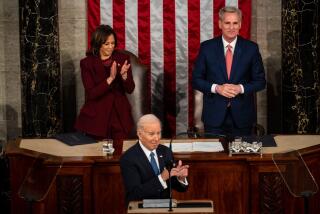Tax Cut and Energy Costs
I purchase 20 gallons of gasoline per week, our electric bill is $100 per month, and natural gas is $60 per month. Now, let’s do the math compared to last year at this time. My annual increase in gasoline will be about $312; estimates for electricity are at $182 and natural gas at about $500, or an increase of $994 in 2001 for just energy costs. And Dubya’s tax plan is going to give me about $650 back in 2001.
I can’t figure how I can help stimulate the general economy with my tax cut, when all of it and more is going to a few energy-producing corporations mostly based in Texas.
BILL PARISH
Ontario
*
Re “The Rich Deserve That Bigger Tax Break,” Commentary, Feb. 11: This debate involves what, for many a middle-income “wage” earner, is the only money that is going to come along. For many, there won’t be an untaxed inheritance when parents die. There may even be a nondeductible expense. There won’t be untaxed savings accounts called “unrealized gains,” like the ever-increasing value of income property. Instead, the wage earner pays nondeductible, ever-increasing rent on that property.
For many there won’t be annual gifts of $10,000 from a relative. And there is no stock portfolio that doubles every eight or nine years.
In the case of the wage earner, almost every cent coming in (even the money for Social Security, which comes in and goes right back out) is “earned income” and it goes on Form 1040, line 31 (taxable income). The wage earner unquestionably should get a higher percentage tax break than the one with all that income that doesn’t ever make it onto Form 1040.
JACK ALLISON
Granada Hills
*
Re “Tax Plan a Reality Check for Democrats,” Feb. 12: I can’t believe the Democrats do not have an opposition strategy that every American can understand. Try this: President Bush’s battle cry is that taxes should be returned to those who pay them. He’s partly right. But it was we the people, the same taxpayers as during the Reagan years, who created the $3 trillion-plus national debt. Shouldn’t that be paid back first, before we pay ourselves again? Or don’t we care if our children are strapped with the debt we ourselves created?
When the national debt is paid down, interest rates come down, which makes it cheaper for taxpayers to borrow for a house, a car and everything else. That’s even better than a tax cut. If that’s not enough, the Democrats should emphasize the inequity of Bush’s plan, where the biggest windfalls go to those who have the best ability to pay and the scraps go to the middle class.
AL YABLON
Oxnard
*
Before Congress and the president pass a massive new tax cut, they would be wise to consider paying off the “invisible” national debt. Billions of dollars need to be paid for deferred maintenance on federal buildings, highways and national park and forest facilities. The budget cuts of the past several years have taken a toll on these and other public facilities and many need extensive reconstruction. Unless this issue is addressed soon, we could be faced with a major fiscal deficit as well.
ALAN COLES
Long Beach
More to Read
Inside the business of entertainment
The Wide Shot brings you news, analysis and insights on everything from streaming wars to production — and what it all means for the future.
You may occasionally receive promotional content from the Los Angeles Times.








